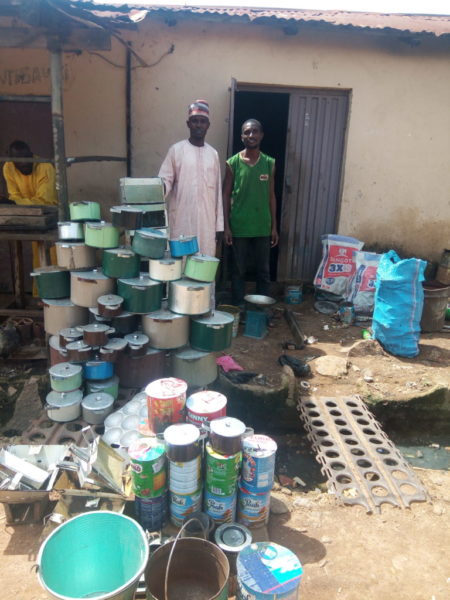
Since the month of August, 2018, the research team at Ahmadu Bello University Zaria (ABU) has been conducting interviews in two towns in Kaduna, Badarawa Kwaru and Malali. The aim was to situate the topic of neighbourhood crime within the wider dynamics of income generation and everyday struggles amongst communities. Babagana Abdullahi, one of the field researchers, reflects on the alternative sources of income or “side hustles” described by a selection of interlocutors.
In many African cities, putting various alternative sources of income has become routine. Developing survival mechanisms becomes an important strategy, especially for low income communities working in the informal sector. In our research, we have found many of the inhabitants of Badarawa Kwaru and Malali engaging in more than one business to survive. These alternative businesses, or what is sometimes referred to locally as a “side hustle”, are the building blocks of people’s livelihoods. While it may seem obvious to always have a contingency plan especially when it comes to making a living and surviving, we want to better understand the dynamics of how this works out in places like Badarawa Kwaru and Malali.
Many of our interlocutors complained about the present-day hardships, which has made depending on all sorts of alternative sources of income a vital back-up plan. Lukman Mustapha of Malali community, a teacher in an Islamic school, spends the time when he is not teaching in a metal work shop, because, there are times when his metal work business bails him out financially when his teaching job cannot cover his living costs. For Lukman, the metal work job is a backup as well as a side hustle. The backup is an alternative which is part of his major income. It is distinct and organized as much as his major source of income. The side hustle is not a distinct income generator as it can change at any time. Though, it is a source of income which is only used to fill little expenditure gaps. Both the backup and side hustle do not only bring in additional income but also allows flexibility to work full time regular job. He explains:
“Recently, my teaching job cannot cater for all my needs, so I spend time here in this metal workshop to make money to top up. Though, both the shop and the school are equally important, because we try as much as possible to engage little boys as apprentices in the shop to prevent them from going around picking items on the street, because they sometimes do away with valuable items in the process.”
Lukman trains these pre-teens, who are between the ages of 9 and 16 years, in the metal shop so he can keep them in line and out of trouble and petty street theft, but he also relies on them to bring him valuable metal scraps (if they bring any, though not his major source of metal) from their street waste collection. Side hustle sometimes, but not always, depends on raw materials often provided by these youths and has to be extra careful not to buy stolen materials in some cases.

Unlike Lukman who found side hustle locally, other interlocutors spoke of their willingness to travel far beyond their neighbourhood to find additional sources of income. For Ibrahim Mohammed Yanda from Badarawa Kwaru, his side hustle is not tied to location. He explained:
“I go anywhere my work takes me. I also go as far as Abuja and Zaria. When there is no work to do since our work is based on demand, I do any other thing that will fetch me clean money. This is better than being idle as it can lead to temptation as we see boys doing in this community.”
For Ibrahim, these other sources of income are side hustles. In the past, people like Ibrahim working in a particular trade such as masonry would have a ‘lead-livelihood’, or main source of income, with perhaps a set of extra income activities on the side, just in case. Ibrahim sees the side hustle not just as a means of survival and meeting needs, but also as a way of mitigating or even preventing stealing. Today, it is difficult to differentiate between these different sources of income, and know which one is the ‘lead’ source of livelihood versus the extra bid on the side. Increasingly, the income from the side hustle tends to cater for needs better than the lead-livelihood. Additionally, Ibrahim explains that, during the Harmattan period (i.e. dry season that lasts between the end of November and mid-March), they get a lot of contracts; as this is the time when many like building their houses. Therefore, all sources of income are equally important, and equally insecure.
In addition to topping up one’s source of income due to economic instability, relying on alternative sources of income and side hustles has also become a key part of how people manage risks in their everyday life. Usman Sanusi who is a satellite dish installer in Ungwan Dosa works as a contract staff in an insurance company. He lamented that:
“I am engaged in a Quarry business and as a transporter of sharp sand for construction, but decided to get a job since I am educated. The reason for this, is to prevent what happened to my brother who has a textile shop. His shop was burgled and till date, the business crumbled as a result. I decided to seek other sources so as not to be a victim of such circumstance”.
Alternatives sources of income and side hustles have therefore become a way of life: survival instincts that also become crucial strategies for mitigating a variety of risks – economic unpredictability and crime most notably.